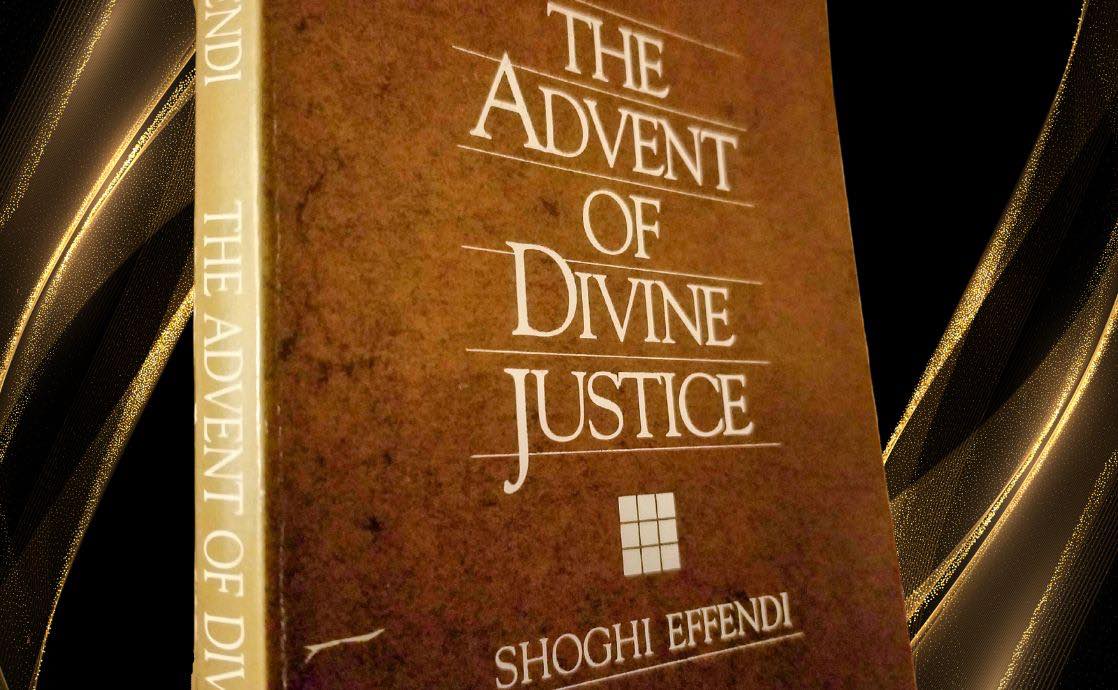In the kaleidoscopic tapestry of spiritual literature, ‘The Advent of Divine Justice’ stands out as a seminal work that intricately weaves the doctrines of the Bahá’í Faith with the exigencies of contemporary life. Authored by Shoghi Effendi, the Guardian of the Bahá’í Faith, this opus encapsulates the essence of divine guidance, elucidating principles that serve as a framework for leading a life anchored in purpose and justice. This exploration provides an in-depth analysis of the various themes and insights that readers can expect to encounter within this profound text.
One of the most striking aspects of ‘The Advent of Divine Justice’ is its profound discourse on justice itself. Justice is rendered not merely as a concept but as a tangible and dynamic force that ought to be integrated into every facet of human endeavor. Readers will delve into discussions that illuminate the multifaceted dimensions of justice, encompassing personal, social, and cosmic realms. The emphasis on justice as a divine imperative serves as an invitation to cultivate resilience against the moral turpitude often depicted in modern society.
Shoghi Effendi eloquently posits justice as the bedrock upon which an equitable society must be established. This concept extends beyond the individualistic approach of self-interest; it exhorts the reader to engage in a collective consciousness aimed at fostering societal well-being. Thus, throughout the text, readers are called to engage with the moral rectitude of their actions, advocating for social justice as an avenue toward spiritual elevation.
The exposition of ethical principles provides another compelling dimension to the work. Readers can expect a rigorous examination of the ethical frameworks that underpin Bahá’í teachings. The text delineates principles such as honesty, integrity, and altruism, urging individuals to internalize these virtues to navigate life’s complexities. In an age where ethical relativism often prevails, Effendi’s delineation of ‘truth-speaking’ and ‘corruption’ brings forth compelling arguments that compel contemplation and introspection.
Furthermore, the notion of a ‘unified humanity’ stands as a pivotal theme within the narrative. The Bahá’í perspective promotes the idea of the oneness of humankind, navigating the intricate interplay between individual identity and collective responsibility. Through the lens of unity, readers are encouraged to transcend divisive ideologies, promoting dialogue and understanding among diverse communities. This exploration serves as a poignant reminder of the moral imperative to engage with one’s fellows empathetically, fostering environments conducive to harmony and cooperation.
Readers will also encounter detailed guidelines on the responsibilities that accompany freedom. Effendi meticulously articulates that liberty is not an end in itself, but a conduit through which one can fulfill moral and spiritual responsibilities. This juxtaposition invites reflection on the delicate balance between personal liberties and communal obligations, urging a reevaluation of the often myopic pursuit of individualism. By establishing this balance, readers are invited to embrace a life of service, wherein personal empowerment translates into societal progress.
The text further delves into the transformative power of education, advocating for its role as a catalyst for personal and communal advancement. Education is not merely an academic pursuit; instead, it embodies a holistic journey that encompasses moral and spiritual dimensions. Effendi’s insights elevate the discussion of education to a moral imperative, urging individuals to seek knowledge not for mere fulfillment but as a means to actualize one’s potentials in service to humanity. Thus, the narrative becomes a call to action—urging the reader to champion educational endeavors as a means of upliftment for oneself and others.
Amidst these explorations, ‘The Advent of Divine Justice’ also embraces the inevitability of trials and tribulations. Shoghi Effendi articulates that tests and difficulties are intrinsic to the spiritual journey, serving as opportunities for growth and development. His reflections encourage readers to reframe adversity through a lens of potentiality, inviting them to cultivate resilience and fortitude. This perspective fosters a deeper understanding of suffering and its role in the divine economy of human experience.
Accompanying the themes of justice and unity, the text also engages with the notion of service. The imperative to serve humanity is woven throughout Effendi’s work, interpreted as both a privilege and a responsibility. Readers will find that service transcends traditional notions of charity; it becomes an essential part of one’s spiritual identity. In recognizing that one’s purpose extends beyond personal fulfillment, individuals are invited to contribute to the betterment of society as a whole.
Moreover, the significance of global citizenship emerges as a salient theme. ‘The Advent of Divine Justice’ challenges readers to expand their scope of concern, moving beyond local considerations to embrace a global perspective toward issues affecting humanity. This shift necessitates a nuanced understanding of interconnectedness, urging individuals to acknowledge their roles within the broader tapestry of human affairs.
As readers navigate the pages of ‘The Advent of Divine Justice’, they will find that its teachings are not merely theoretical; they are practical blueprints that can guide purposeful living. The text functions as a call to embody the principles of justice, unity, and service in daily life, thereby fostering a life that resonates with divine purpose.
In conclusion, the intricate arguments and profound insights encapsulated within ‘The Advent of Divine Justice’ offer a perennial resource for those seeking to navigate the complexities of contemporary existence. Through its exploration of justice, ethical principles, education, and global responsibilities, the work provides a roadmap for individuals aspiring to construct a fulfilling and purposeful life. Readers are ultimately invited to reflect upon their roles within the grand narrative of humanity, striving toward not only personal enlightenment but societal transformation. The text is a profound reminder that to live justly and purposefully is to embody the very essence of divine will in a world yearning for harmony and understanding.
